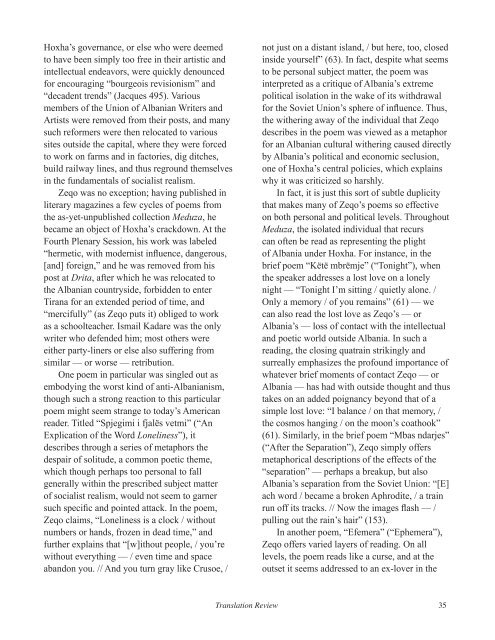Table of contents - The University of Texas at Dallas
Table of contents - The University of Texas at Dallas
Table of contents - The University of Texas at Dallas
Create successful ePaper yourself
Turn your PDF publications into a flip-book with our unique Google optimized e-Paper software.
Hoxha’s governance, or else who were deemed<br />
to have been simply too free in their artistic and<br />
intellectual endeavors, were quickly denounced<br />
for encouraging “bourgeois revisionism” and<br />
“decadent trends” (Jacques 495). Various<br />
members <strong>of</strong> the Union <strong>of</strong> Albanian Writers and<br />
Artists were removed from their posts, and many<br />
such reformers were then reloc<strong>at</strong>ed to various<br />
sites outside the capital, where they were forced<br />
to work on farms and in factories, dig ditches,<br />
build railway lines, and thus reground themselves<br />
in the fundamentals <strong>of</strong> socialist realism.<br />
Zeqo was no exception; having published in<br />
literary magazines a few cycles <strong>of</strong> poems from<br />
the as-yet-unpublished collection Meduza, he<br />
became an object <strong>of</strong> Hoxha’s crackdown. At the<br />
Fourth Plenary Session, his work was labeled<br />
“hermetic, with modernist influence, dangerous,<br />
[and] foreign,” and he was removed from his<br />
post <strong>at</strong> Drita, after which he was reloc<strong>at</strong>ed to<br />
the Albanian countryside, forbidden to enter<br />
Tirana for an extended period <strong>of</strong> time, and<br />
“mercifully” (as Zeqo puts it) obliged to work<br />
as a schoolteacher. Ismail Kadare was the only<br />
writer who defended him; most others were<br />
either party-liners or else also suffering from<br />
similar — or worse — retribution.<br />
One poem in particular was singled out as<br />
embodying the worst kind <strong>of</strong> anti-Albanianism,<br />
though such a strong reaction to this particular<br />
poem might seem strange to today’s American<br />
reader. Titled “Spjegimi i fjalës vetmi” (“An<br />
Explic<strong>at</strong>ion <strong>of</strong> the Word Loneliness”), it<br />
describes through a series <strong>of</strong> metaphors the<br />
despair <strong>of</strong> solitude, a common poetic theme,<br />
which though perhaps too personal to fall<br />
generally within the prescribed subject m<strong>at</strong>ter<br />
<strong>of</strong> socialist realism, would not seem to garner<br />
such specific and pointed <strong>at</strong>tack. In the poem,<br />
Zeqo claims, “Loneliness is a clock / without<br />
numbers or hands, frozen in dead time,” and<br />
further explains th<strong>at</strong> “[w]ithout people, / you’re<br />
without everything — / even time and space<br />
abandon you. // And you turn gray like Crusoe, /<br />
not just on a distant island, / but here, too, closed<br />
inside yourself” (63). In fact, despite wh<strong>at</strong> seems<br />
to be personal subject m<strong>at</strong>ter, the poem was<br />
interpreted as a critique <strong>of</strong> Albania’s extreme<br />
political isol<strong>at</strong>ion in the wake <strong>of</strong> its withdrawal<br />
for the Soviet Union’s sphere <strong>of</strong> influence. Thus,<br />
the withering away <strong>of</strong> the individual th<strong>at</strong> Zeqo<br />
describes in the poem was viewed as a metaphor<br />
for an Albanian cultural withering caused directly<br />
by Albania’s political and economic seclusion,<br />
one <strong>of</strong> Hoxha’s central policies, which explains<br />
why it was criticized so harshly.<br />
In fact, it is just this sort <strong>of</strong> subtle duplicity<br />
th<strong>at</strong> makes many <strong>of</strong> Zeqo’s poems so effective<br />
on both personal and political levels. Throughout<br />
Meduza, the isol<strong>at</strong>ed individual th<strong>at</strong> recurs<br />
can <strong>of</strong>ten be read as representing the plight<br />
<strong>of</strong> Albania under Hoxha. For instance, in the<br />
brief poem “Këtë mbrëmje” (“Tonight”), when<br />
the speaker addresses a lost love on a lonely<br />
night — “Tonight I’m sitting / quietly alone. /<br />
Only a memory / <strong>of</strong> you remains” (61) — we<br />
can also read the lost love as Zeqo’s — or<br />
Albania’s — loss <strong>of</strong> contact with the intellectual<br />
and poetic world outside Albania. In such a<br />
reading, the closing qu<strong>at</strong>rain strikingly and<br />
surreally emphasizes the pr<strong>of</strong>ound importance <strong>of</strong><br />
wh<strong>at</strong>ever brief moments <strong>of</strong> contact Zeqo — or<br />
Albania — has had with outside thought and thus<br />
takes on an added poignancy beyond th<strong>at</strong> <strong>of</strong> a<br />
simple lost love: “I balance / on th<strong>at</strong> memory, /<br />
the cosmos hanging / on the moon’s co<strong>at</strong>hook”<br />
(61). Similarly, in the brief poem “Mbas ndarjes”<br />
(“After the Separ<strong>at</strong>ion”), Zeqo simply <strong>of</strong>fers<br />
metaphorical descriptions <strong>of</strong> the effects <strong>of</strong> the<br />
“separ<strong>at</strong>ion” — perhaps a breakup, but also<br />
Albania’s separ<strong>at</strong>ion from the Soviet Union: “[E]<br />
ach word / became a broken Aphrodite, / a train<br />
run <strong>of</strong>f its tracks. // Now the images flash — /<br />
pulling out the rain’s hair” (153).<br />
In another poem, “Efemera” (“Ephemera”),<br />
Zeqo <strong>of</strong>fers varied layers <strong>of</strong> reading. On all<br />
levels, the poem reads like a curse, and <strong>at</strong> the<br />
outset it seems addressed to an ex-lover in the<br />
Transl<strong>at</strong>ion Review 35

















